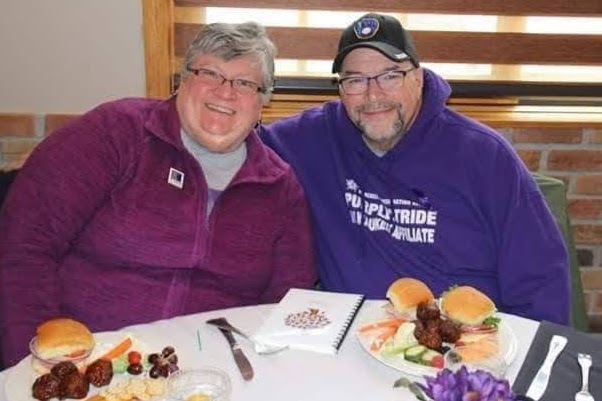
RAYMOND SHUPE
After 9-Years, Raymond Has No sign of Pancreatic Cancer
Written By Julia Brabant
March 14, 2022
Diagnosed: February 2012
Status: No sign of Cancer
Raymond Shupe had his gallbladder removed in 1998, so when he started experiencing similar pain the following year, he knew of at least one thing he could rule out. Not knowing exactly what was causing his symptoms, he underwent an “endoscopic retrograde cholangiopancreatography,” or ERCP, which helps identify issues within the liver, gallbladder, pancreas or bile ducts.
The ERCP revealed a small spot the doctor referred to as a “mucus plug.” Ray continued to have more ERCP procedures every six months from 1999 until 2012 to keep an eye on things, with the procedures not revealing any growth or changes during that time.
By early 2013, Ray started experiencing back pain and jaundice, which causes yellowing of the eyes and skin. He contacted his gastroenterologist, who in turn sent him to the local hospital emergency room. There, doctors performed another ERCP and installed a stent, which helps relieve pain and symptoms associated with jaundice. They determined that the spot doctors had identified long ago had grown against his bile duct and that was the cause of the pain and jaundice.
The following day, his doctor broke the news. “I think it’s time for us to have the hard talk,” he’d told Ray and his wife, Brenda. “I think the pancreas needs to come out.”
Doctors had identified a tumor in the “neck” of the pancreas, meaning it was located somewhere between the tail and the head. His medical team told him that, while they could remove his pancreas there, one of the world’s leading pancreatic cancer surgeons, Dr. Douglas B. Evans, M.D., F.A.C.S., worked at the nearby Froedtert & the Medical College of Wisconsin.
Ray’s doctor contacted Dr. Doug Evans to make the referral and within a matter of days, Ray met with Dr. Evans. After reviewing Ray’s existing scans and test results, Dr. Evans agreed with Ray’s original doctor and concluded his entire pancreas would have to come out.
Ray underwent a whole pancreatectomy March 22, 2013, with doctors removing his entire pancreas as well as his spleen, part of his stomach, part of his small intestine and the end of his common bile duct. After doing so, they determined that he had Stage 1 pancreatic cancer. This meant the tumor was relatively small in size and had not yet spread outside the pancreas.
Ray spent two weeks in the hospital recovering from the procedure and then followed that up with six months of chemotherapy, which he tolerated relatively well. He then had five-and-a-half weeks of daily radiation, which he says was much more brutal than the chemo.
He also became diabetic and fully insulin-dependent in the wake of his surgery, as the body is unable to produce its own insulin without a pancreas. He takes Humalog and Lantus to manage his diabetes and also takes CREON, a prescription medication that helps patients who are unable to digest foods due to a lack of pancreatic enzymes.
By 2014, Ray began seeing Dr. Douglas Evans every 90 days for follow-up visits, and eventually, those visits started taking place every six months – and then every two years. His last visit two years ago showed that he is still cancer-free.“I feel blessed, believe me,” he said. “If you’re going to have pancreatic cancer, then my outcome is about as good as you can hope for.
He credits Dr. Douglas Evans and his medical team with that positive outcome – as well as his wife and three adult children, Jessica, Nathan and Matthew, all of whom were a tremendous source of support along the way.
And while Ray has managed to live a relatively normal life in the years since his diagnosis, he does recognize that the financial and professional ramifications of a pancreatic cancer diagnosis are significant. He had an attorney help him navigate the process involved in obtaining Social Security Disability benefits, and he also had six months of COBRA health insurance coverage through his former employer, which helped him manage the financial angle of his battle. He notes, though, that not everyone has those options.
“It’s tough because you’re at your highest income potential, but you can’t work,” said Ray, who was 58 at the time of his diagnosis. “And then, when you can, not everyone wants to hire someone who is 60 years old.”
Ultimately, Ray, who’d had a long, successful career in executive-level management, wound up returning to work part-time after his cancer battle. He also seized the opportunity to get more involved in advocacy efforts and volunteer work. He helped form a youth group alongside several parishioners from his church, and while he has since retired, the youth group is still going strong.
He and Brenda have also become increasingly vocal advocates within the pancreatic cancer community, serving as co-chairs of the PanCAN.org PurpleLight National Vigil for Hope for Pancreatic Cancer.
“My wife was really more of the chairperson,” Ray notes. “I was more like her assistant.”
Ray is also a member of the PanCAN Survivor Council and served as the keynote speaker at PanCAN’s 2015 Purple Stride event, which raises funding and awareness for pancreatic cancer research. He said that, back in 2013, there weren’t as many options as far as resources or support services for patients with pancreatic cancer, but he’s seen that change in recent years.
“Back in 2013, I didn’t really have anyone to talk to about this other than doctors,” Ray said. “The same goes for my wife.”
That’s why Ray told Dr. Evans he could give Ray’s cellphone number to any patient who might want to talk to someone – and why both Ray and Brenda have taken comfort in communicating with other patients and caregivers in the years since Ray’s diagnosis.
Now, Ray and Brenda live full-time in Port Washington, Wisconsin, in a house overlooking Lake Michigan. Ray sees an endocrinologist every six months and manages his diabetes well, and he’s eager for Brenda to join him in retirement later this spring.
“I’ve received excellent care from Dr. Douglas B. Evans, my wife and my kids,” he said. “And I’ve been blessed to have nine extra years with my family.”



